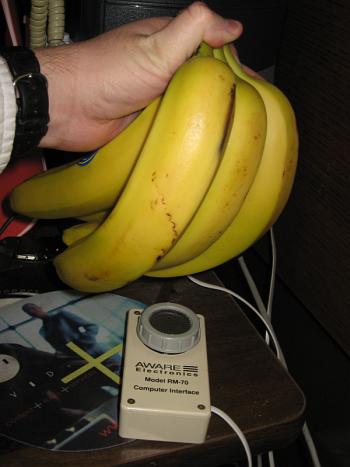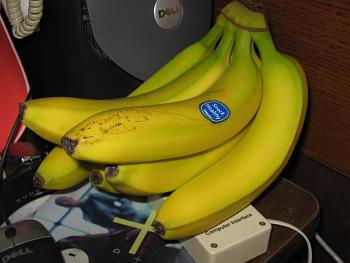
Are bananas radioactive? We've all heard they are rich in potassium, good to eat to restore electrolyte balance in the human body, but since they have potassium they're bound to have some potassium-40 in them, like our own bodies do.
How much 40K? Bananas have 400-450mg of potassium; interestingly the state of Colorado says potatoes are a better source (750mg per medium potato). Potassium-40 is isotopically 0.01177% of natural potassium, so that's 0.05mg or 50ug of 40K.
***This sentence was the error in the original post:
In fact, the specific activity of potassium-40 is 258,000 Bq/g. 30Bq/g is the specific activity of generic potassium; that is, potassium that has 0.01177% K-40.
So, the banana actually has 13.5Bq.
It's not detectable, by me at least. My body has 4000Bq of K-40, but the geiger counter doesn't change from background when I'm near it. The geiger counter didn't see the bunch of bananas either.
Sorry, Kristin, the counter didn't move.
It does move for pure potassium chloride though.

3 comments:
Well, presumably it's just a question of S/N. If you just integrate long enough and get a handle on the systematics...
That's certainly true. I did let them sit for an hour (the sampling time is one minute) and after an hour it gives me a running average, which was the same as before. 7.something uR/hr, same as ever. It reads 7.38 right now for the hour and 7.21 for the 12 day average (since I rebooted).
Oops, I made an error in the calculation: 30Bq/g is the specific activity of natural potassium. 258,000Bq/g for potassium-40.
Post a Comment